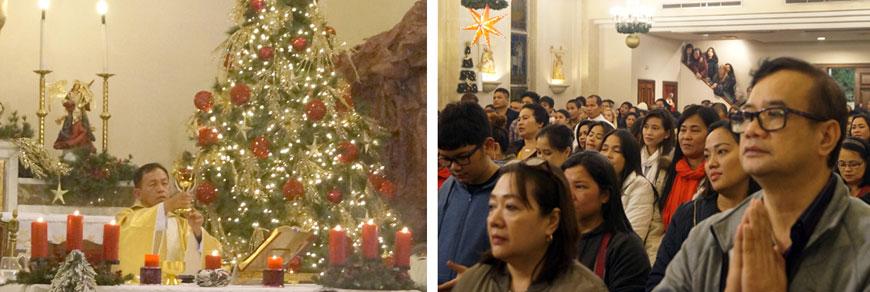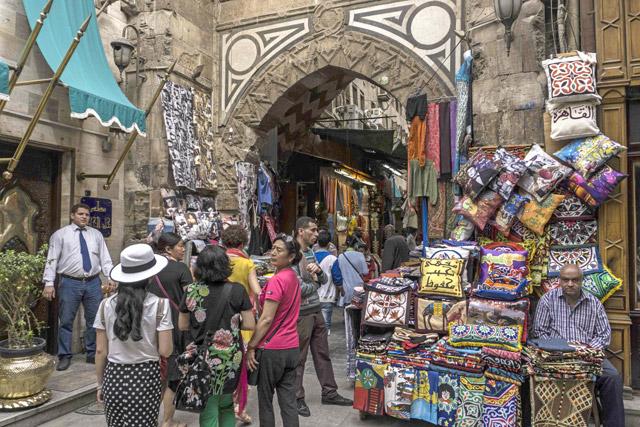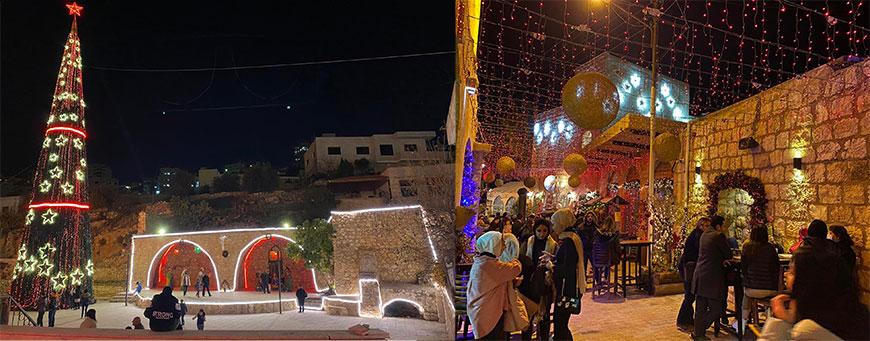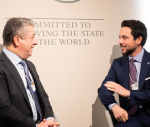You are here
COVID fails to dim Christmas spirit in Fuheis
By Serena Bilanceri - Dec 26,2020 - Last updated at Dec 26,2020
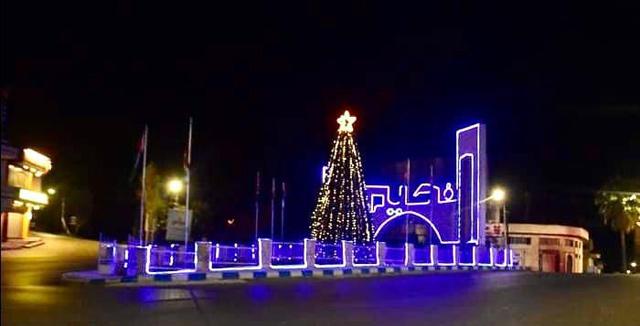
Christmas lights and decorations are seen in a street of Fuheis, some 12km west of Amman, on Christmas Eve, Thursday (Photo by Osama Aqarbeh)
FUHEIS — The bells are ringing. The deacon, in his white and golden vestment, swings the thurible around the altar, spreading clouds of incense in front of the worshippers, who have congregated in the St. George Catholic Church in Fuheis. The prayers begin.
So starts the video of the Christmas mass that has been live-streamed on the Facebook page “Fuheis Net” on Thursday evening.
It could be a normal, typical religious service on Christmas Eve. But this year, something is different. The deacon is covering his mouth and nose, as is the priest officiating the mass, who wears a black face mask. And for many worshippers, the live stream might be the only possibility to follow the service.
Due to the safety measures against COVID-19, the available places in the church are reduced. And many believers might not be comfortable with attending religious gatherings this year.
“People are not relaxed, not praying freely, it is a difficult situation”, deacon Salim Haddad told The Jordan Times after the service.
He estimated that some 10 per cent of the usual worshippers attended mass on Thursday.
Father Boulos Haddad said it might have been a bit more than that, but still well under the usual attendance rate.
The liturgy itself has not been affected, the deacon said. “But we skipped some texts, trying to make it shorter than it was before,” he said, adding that two more masses had been scheduled to divide the worshippers in smaller groups. The service was even streamed on a screen in a space outside of the church.
The pandemic has also affected many Christian migrant workers, who gave up their plans to come back home for the festivities, due to travel restrictions, fear of the virus or high costs.
Sara Banna, a Romanian restaurant owner from Amman, who has come to Fuheis, some 12km west of Amman, to attend the service with friends, said she had not been able to feel the Christmas spirit until now.
“This is my first Christmas in Jordan. Usually, I travel to Romania for Christmas. We go with friends out of the city, to the mountains or the countryside, and we spend time there. We open the door of our house and children come inside, singing Christmas songs. We give them fruit juices and food, it goes on the whole day. It’s very different from here,” she said.
Also for Alex H., a 42-year-old Romanian engineer, this Christmas is going to be different from what he had planned. He has been in the country, working near the Dead Sea, for just over a year.
“Last year I could not go home because my boss did not let me, this year it is corona,” he said. “So I will spend Christmas here, with my adoptive family.”
He said that the current temperatures near the Dead Sea make it difficult for him to feel Christmas. “I like the weather there, but for me it feels like spring,” he added.
For both of them, coming to church was very important – even though they arrived late due to the traffic.
“I feel good now, it was very important for me that we reached the place. Even for five minutes, just to light a candle. The atmosphere here in Fuheis is very different from the one in the city. Here you can feel Christmas,” Banna said.
Jenya, a 35-year-old manicurist from Russia, agreed. The Christmas lights and decorations hanging in front of the shops, the illuminated Christmas trees, people dressed as Santa Claus on the street also contributed to create the atmosphere, according to the three young people.
“But in the end, it does not matter where you are celebrating, as long as you are with the right persons,” said Banna.
She and her friends had planned to have dinner in a restaurant after the mass, but they had to cancel for fear that they could have not arrived on time, given the curfew restrictions.
But the pandemic this year has affected not only the migrant community. “This year is a very special year, a very special case, there have been no celebrations, no bazaar – only online. Before, we used to have various activities,” said Father Boulos. And the pandemic, he added, has made it difficult for the elderly to celebrate with their families.
“We used to give communion at home to 33 persons, but now we cannot visit them,” he said, noting that the health crisis has also worsened the economic situation of some families.
The priest noted that even before the pandemic there were some persons in difficult financial situations, but they now “wished to return” to the situation they were in before the coronavirus spread.
The words of the last prayers still resound through the aisle, reverberating on the white church walls, under the crystal chandeliers. The worshippers begin to leave the church, exchanging some brief greetings. Heading home, where many will be spending a solitary Christmas day this year.
Related Articles
AMMAN — Spreading the Christmas spirit, the choir sang: “Hark!
CAIRO — Egypt tightened security outside churches as Coptic Christians prepared for a subdued Easter mass on Saturday days after suicide bom
FUHEIS — Home to the largest Christmas tree in Jordan and famous for its 19th century churches, Fuheis, welcomes Christmas with dazzling dec


